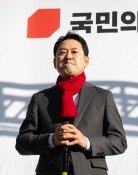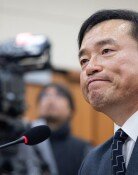Is the Governments Amateurism Coming to an End?
Is the Governments Amateurism Coming to an End?
Posted July. 21, 2005 03:05,
As President Roh accepted Chairman Lees resignation, attention is being paid to what lies behind the presidents acceptance. Currently, 12 administrative committees operate under Lees supervision. When the chairman actually steps down, some changes to the personnel and the structure of the committees are likely to follow.
Presidential Committee on Education Innovation Chairman Chun Sung-eun will complete his service shortly, and it is said that he will be replaced. The Presidential Committee on Aging and Future Society deals with the issues of aging population and low fertility rates. From September on, the president will directly preside over the committee under a new name, The Committee on Aging.
Why Did He Leave?
Cheong Wa Dae points out that as the first-term Presidential Commission on Policy Planning (PCPP) comes to an end, it is required to play a different role. For the last two-and-a-half years, it has initiated and led mid- to long-term roadmaps for state affairs. Now that the presidency has passed its midpoint, the implementation of the roadmaps through concrete policies is expected.
In the future, the Office of the Chief Secretary to the President for National Policy will ensure and coordinate the implementation of about 100 roadmaps in each department, while the PCPP will remain an advisory body as it is now.
Chairman Lee joined President Rohs advisory group during the 2002 presidential election. In January 2003, he was deeply involved in drawing up the blueprint of the Participatory Governments economic policy. Back then, he served as a managerial member of the first economic subdivision in the special committee on the takeover of the presidency. After the presidents inauguration, he was appointed to be the chief secretary to the president for national policy. In January 2004, he took over the leadership of the PCPP from Lee Jong-oh, who failed to finish his tenure.
For about two years and seven months, Chairman Lee was one of the closest senior officials to the president and helped shape important economic policies. His first work was a sweeping real estate plan in October 29, 2003, characterized by an increase in real estate taxes. He also took the lead in introducing new rules that govern inheritance and donation taxes, which help prevent tax evasion, securities class action suits, and other measures, which concern big corporations.
The measures were criticized for not reflecting market realities during an economic slowdown. And it was rumored that the chairman was at odds with former Prime Minister and Minister of Finance Lee Heon-jae, who put the focus on growth. Some observe that the president let the chairman leave the commission because the president is concerned about the implications of the drastic real estate policies to be announced in August. In other words, the president might be attempting to relieve his administration of a burden by keeping Lee, whose distribution-leaning stance is well known, off the list of his senior officials.
Will There Be Any Shift in Economic Policy Direction?
Chairman Lee will continue to hold the post of special presidential aide on national policy. But it will be on a part-time basis, not full-time. So far, as a special presidential aide, he has been present regularly at meetings for advisors and senior secretaries. At those meetings, he was seated to the left of President Roh. Chief of Staff Kim Woo-sik sits on his right.
Those close to Cheong Wa Dae say that Chairman Lees resignation will hardly cause changes in President Rohs economic policy. Cheong Wa Dae, too, repeatedly stressed, There will be no change in policy direction.
The real estate policies due out in August will raise the real estate tax. So the trend in policy making set by Lee Jeong-woo will remain in place. On several occasions, President Roh expressed his support for the chairmans emphasis on long-term strategies, which can be summed up as refusing to rely too much on short-term economic stimuli even in the face of economic hardships.
Lees successor is likely to be a professor. Three or four, including Korea University professor Lim Hyeok-baek, are on the list.
What Is the Response From the Business Community?
While the business community hails the decision, it remained calm on the surface. An official at the Federation of Korean Industries took the resignation as a signal of a turning point in the governments economic management. He said, After the participatory governments inauguration, officials in the economic and financial departments including the Finance Ministry argued for a growth-oriented and market-friendly policy. But the government pushed ahead with its own policy.
He added, The president has less than half of his term left. I hope that the resignation triggers a move toward encouraging investment and carrying out market-friendly measures.
An LG executive noted, Chairman Lee seemed to cling to highly idealistic, unrealistic measures. Symbolically, the governments liking for distribution will be considerably toned down.
An insider at one of the business organizations pointed out, We need to view that Chairman Lees determined stance on the property market has been influenced by the president. His resignation might be just a different guise for the same body.
Jung-Hun Kim jnghn@donga.com yhchoi65@donga.com







